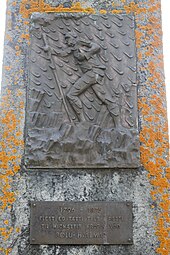Bólu-Hjálmar
Bólu-Hjálmar (actually Hjálmar Jónsson ; born September 29, 1796 in Halland , Eyjafjörður ; † July 25, 1875 in Víðimýri , Skagafjörður ) was an Icelandic poet .
Life
Hjálmar was the illegitimate son of a beggar woman and was raised by a peasant woman. As an adult he also became a farmer in Bólstaðargerði , but lived in poverty all his life. He was constantly fighting with his neighbors on a large farm, who accused him of being a thief . Hjálmar was married and had seven children. The name Bólu-Hjálmar refers to his place of residence, the Bóla homestead .
Works
His satirical poems and Rímur were only published posthumously , starting in 1879.
Translated into German was z. B. the poem Feigur Fallandason , which is about his difficult life situation and poverty:
- The doomed
- I find it difficult to write a poem;
- can hardly use the writing spear
- I sleep little at night from gout
- and freeze and have no light
- and can hardly move his limbs because of the cold. (...)
literature
- Jón R. Hjálmarsson: Með þjóðskjáldum við þjóðveginn. Reykjavík 2004, 132-137
- Ernst Walter: Bólu-Hjálmar in: Horst Bien (Hrsg.): Meyers Taschenlexikon Northern European literatures. Leipzig 1978
Individual evidence
- ↑ Icelandic Poetry. Ed. S. Aðalsteinsdóttir, u. a. Berlin 2011. ISBN 978-3-458-35754-4
| personal data | |
|---|---|
| SURNAME | Bólu-Hjálmar |
| ALTERNATIVE NAMES | Hjálmar Jónsson |
| BRIEF DESCRIPTION | Icelandic lyric poet |
| DATE OF BIRTH | September 29, 1796 |
| PLACE OF BIRTH | Halland |
| DATE OF DEATH | July 25, 1875 |
| Place of death | Víðimýri |
